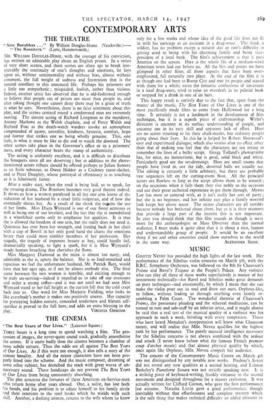CONTEMPORARY ARTS
THE THEATRE
MR. WILLIAM DOUGLAS-HOME, with the courage of his conviction, has written an admirable play about an English prison. In a series of very short scenes, and short scenes are often apt to break irre- trievably the continuity of one's thoughts and emotions, he lays upon us, without sentimentality and without bias, almost without comment, the full weight of sadness and frustration that is the natural corollary to this unnatural life. Perhaps his prisoners are a little too sympathetic ; misguided, foolish, rather than vicious. Indeed, another critic has observed that he is old-fashioned enough to believe that people out of prison are nicer than people in, and after taking thought one cannot deny there may be a grain of truth in what he says. Nevertheless, there is no false sentiment about this play, and the scenes centred round a condemned man are extremely moving. The sincere acting of Richard Longman as the murderer, Antony Marlowe as the Welsh chaplain, and of Percy Walsh and Richard Foat as the death-watch warders invoke an atmosphere compounded of agony, unreality, kindness, hysteria, comfort, hope and horror that strikes one as being wholly genuine. This, one feels, is what it must be like to die and to watch the doomed. The other scenes take place in the Governor's office or in a prisoners' mess, and every character bears the stamp of authenticity.
The acting is uniformly excellent, and it is difficult to distribute the bouquets since all are deserving ; but in addition to the above- mentioned actors tribute should be offered perhaps to Julian Somers as an Irish saboteur, to Owen Holder as a Cockney razor-slasher, and to Peter Doughty, whose portrayal of effeminacy is as touching as it is hilariously funny.
After a sticky start, when the road is being laid, so to speak, for the ensuing drama, The Rossiters becomes very goad theatre indeed. It shows us hcw a women paralysed in all but one arm learns of the seduction of her husband by a cruel little vulgarian, and of how she eventually shoots her. As a result of the shock she regains the use of her limbs. Miss Diana Wynyard is one of our finest actresses as well as being one of our loveliest, and the fact that she is immobilised in a wheelchair seems only to emphasise her qualities. It is true she is allowed the freedom of one arm, but she really does not need it. Quietness has ever been her strength, and leaning back in her chair with a cup of Bovril in her only good hand she charts the emotions better than could most nimbler members of her profession. Her tragedy, the tragedy of impotent beauty at bay, could hardly fail, dramatically speaking, to light a spark, but it is Miss Wynyard's steady human breathing that cherishes the flame.
Miss Margaret Diamond as the minx is almost too nasty, and, admirable as she is, upsets the balance. She is so loud-mouthed and rapacious we feel the unfortunate husband, Mr. Patrick Barr, would have shot her ages ago, or if not he almost anybody else. The final scene between the two women is horrible, and exciting enough to be truly un-nerving—indeed it impelled us to take off our overcoats and order a strong coffee—and it was not until we had seen Miss Wynyard stand to her full height as the curtain fell that the cold crept back into us. One word for Miss Marjorie Fielding, who looks so like everybody's mother it makes one positively uneasy. Her capacity for portraying hidden anxiety, concealed tenderness and blatant self- sacrifice is proved to the full here, and adds an extra blessing to the


































 Previous page
Previous page